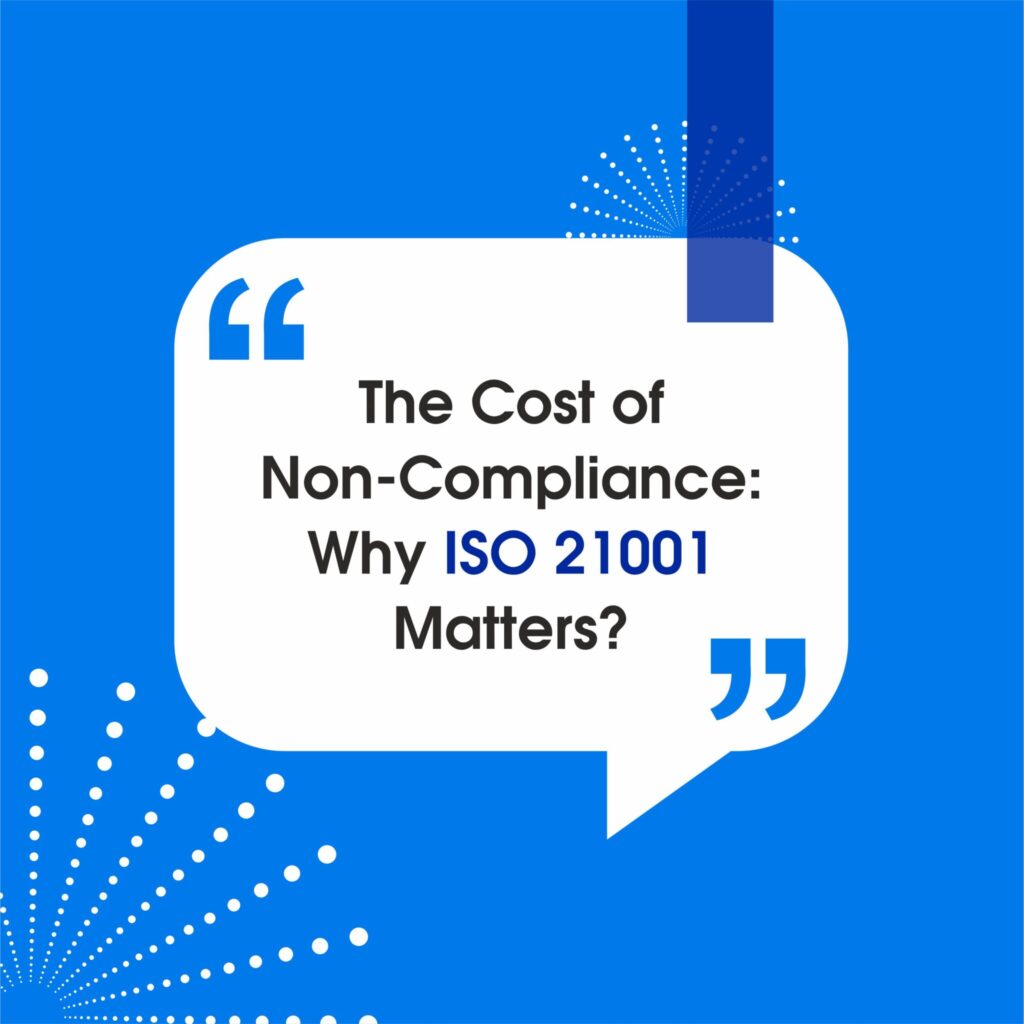The Cost of Non-Compliance: Why ISO 21001 Matters?

ISO 21001:2018 certification is a globally recognised standard that signifies an educational organisation’s commitment to delivering high-quality education services. It focuses on establishing an effective Educational Organisation Management System (EOMS) that ensures the fulfilment of educational objectives, student satisfaction, and continuous improvement. The certification involves a rigorous audit by an accredited ISO certification body to assess compliance with ISO 21001 requirements. Achieving ISO 21001 certification demonstrates an institution’s dedication to providing excellence in education, enhancing stakeholder satisfaction, and fostering a culture of continual improvement in educational processes and outcomes. What could be the possible ISO 21001:2018 standard? ISO 21001 is a standard that helps educational organisations improve their educational management systems. Non-conformities in ISO 21001 refer to instances where an organisation’s practices or processes do not meet the requirements and criteria outlined in the standard. Here is a list of possible ISO 21001:2018 non-conformities: Inadequate Documentation Undefined Educational Objectives Lack of Stakeholder Engagement Inefficient Resource Allocation Non-compliance with Regulatory Requirements Inadequate Curriculum Design Insufficient Feedback Mechanisms Inadequate Corrective Actions Incomplete Training and Development Resource Shortages Data Security and Privacy Ineffective Internal Auditing Failure to Monitor and Measure Inadequate Continual Improvement Lack of Leadership Commitment Inadequate Communication Resource Constraints Student Complaints Non-compliant Faculty Practices Lack of Faculty Training The Consequences of Non-Compliance with ISO 21001 ⮯ Non-compliance with ISO 21001 can have several adverse consequences for educational organisations. These consequences go beyond monetary penalties and can significantly impact an institution’s reputation, credibility, and long-term sustainability. Diminished Educational Quality – Failure to implement ISO 21001:2018 certification may result in a lack of standardisation in educational processes, leading to inconsistencies in curriculum delivery and assessment. Moreover, this can ultimately compromise the quality of education and negatively affect students’ learning experiences and outcomes. Decreased Stakeholder Trust – Stakeholders, including students and parents, trust educational institutions to provide quality education. Non-compliance with ISO 21001 can erode this trust, leading to a decline in enrolment and loss of revenue. Negative word-of-mouth and publicity can further damage an institution’s reputation. Inefficient Resource Utilisation – Without a strong management structure, institutions might have trouble allocating resources effectively. It may lead to a waste of resources, including academic time and money. The ability of an institution to invest in faculty development, infrastructure enhancements, and other crucial changes can be hampered by ineffective resource management. Legal and Regulatory Consequences – ISO 21001-certified educational institutions follow various national and international laws and regulations. It helps them avoid legal implications, fines, and even actions against the institution’s management that may result from noncompliance. Additionally, this may take time and resources away from important instructional tasks. Competitive Disadvantage – ISO 21001 certification is increasingly becoming a differentiator in the education sector. Institutions that have obtained ISO 21001 certification can use it as a marketing tool to attract students and gain a competitive advantage. Non-compliant institutions may find it challenging to compete effectively in the market. Conclusion ✅ ISO 21001:2018 certification is significant for educational organizations, representing their commitment to excellence in education delivery and management. Compliance with this global standard ensures the fulfilment of educational objectives, student satisfaction, and a continuous drive for improvement. It is crucial to address and rectify possible non-conformities in ISO 21001, such as inadequate documentation, undefined educational objectives, and insufficient stakeholder engagement, to maintain the integrity of the educational management system. Enjoy Reading – Non-Conformity and Corrective Action Major/Minor Non-Conformances : Explored in Detail Non-Conformity Blog On ISO 9001:2015
